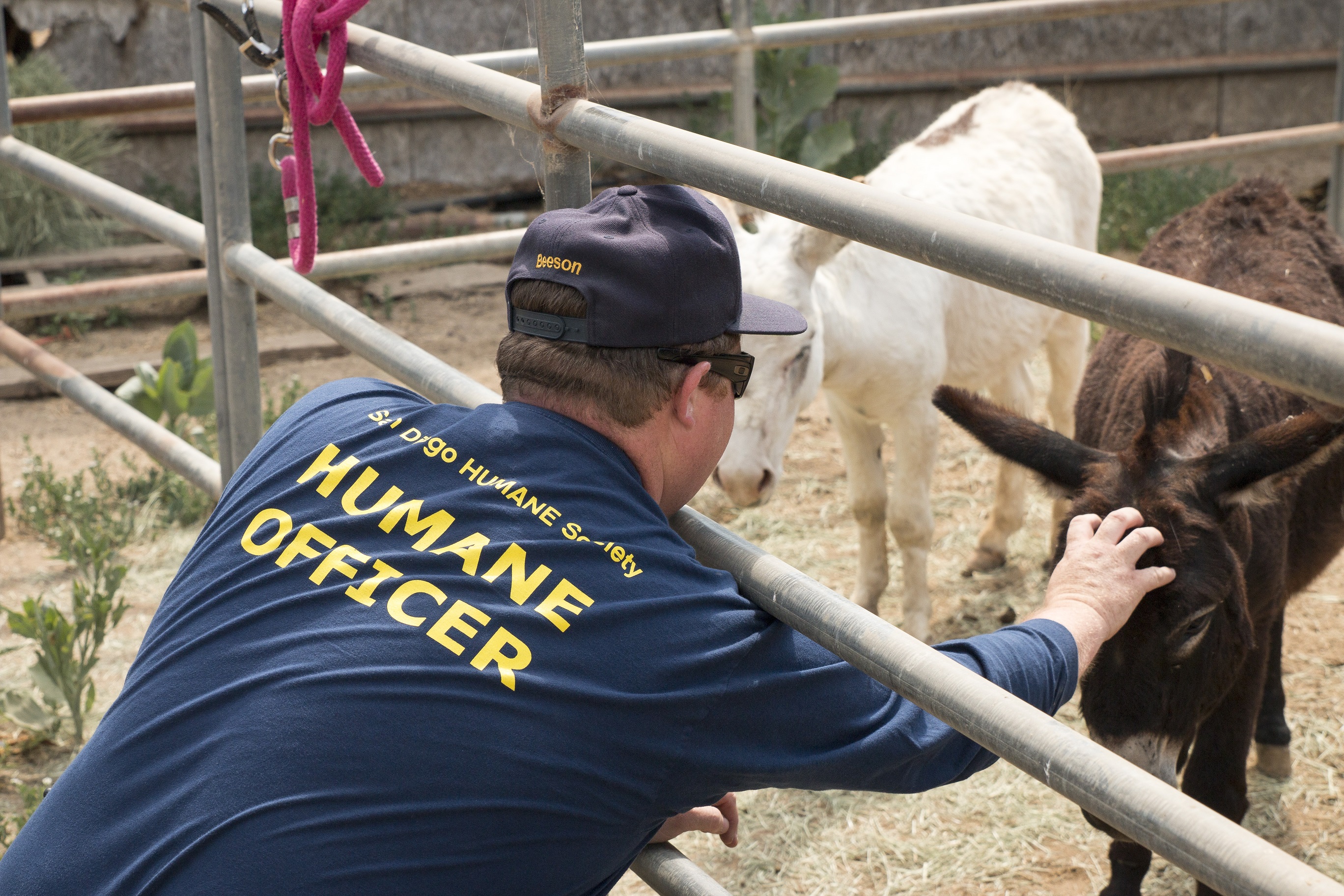Humane Law Enforcement
Report an Animal Emergency
Rattlesnake response: Our Humane Field Services Team responds to rattlesnake calls if the snake is causing imminent danger to humans or domestic animals, such as blocking an entrance/exit or of the snake is inside a residence/business.
If you live in San Diego Humane Society's jurisdiction*, report an animal-related emergency by calling 619-299-7012 (press 1).
* View Jurisdictions by zip code to determine the animal service provider that covers your area.
For animal-related emergencies in the following locations, please contact the corresponding animal control provider:
- Chula Vista, Imperial Beach and Lemon Grove residents should contact Chula Vista Animal Care and Control at 619-476-2476.
- Coronado residents should contact the Coronado Police Department at 619-522-7350.
- National City residents should contact the National City Police Department at 619-336-4411.
- Residents of unincorporated areas of San Diego County should contact the County of San Diego Department of Animal Services at 619-236-2341.
San Diego Humane Society handles animal complaints (strays, off-leash, etc.) for the cities of Carlsbad, Del Mar, El Cajon, Encinitas, Escondido, La Mesa, Oceanside, Poway, San Diego, San Marcos, Santee, Solana Beach and Vista. Please see below for information about animal noise complaints.
If you are a resident outside of these cities and have a concern with a loud animal, see a loose or vicious animal, or find an injured animal, refer to our Jurisdiction Chart to determine which agency to call.
Report Animal Cruelty
Please note, animal cruelty investigations do not include barking dogs, loud cats or loose animals. To report a case of animal cruelty or neglect, you may call 619-299-7012 (press 1) or fill out this online Animal Cruelty Form. Alternatively, You may mail in or drop off a hard copy of this PDF Animal Cruelty Form. All reports may be submitted anonymously.
Report a Dog Bite
For expediency regarding your dog bite report, please fill out and submit the online form below before calling.
Barking Dog and Animal Noise Complaints
View our Jurisdiction Chart to determine which agency handles noise complaints in your area.
If you are a resident in the City of San Diego, barking dog complaints are handled by the city’s Code Enforcement Department. Please use this link to file your report:
Animal noise complaints for the cities of Carlsbad, Del Mar, El Cajon, Encinitas, Escondido, La Mesa, Oceanside, Poway, San Marcos, Santee, Solana Beach and Vista are handled by San Diego Humane Society.
If you are a resident outside of these cities and have a concern with a loud animal, call your local police agency or code compliance department.
For expediency regarding barking dog complaints, you may fill out and submit the form below.
About San Diego Humane Society's Humane Law Enforcement
On June 9, 1880, San Diego Humane Society officers levied the first fine against animal cruelty to “Mr. Collins’ boy for overriding a colt.” Since that day, our officers have been dedicated to enforcing animal cruelty and neglect laws so that all animals are treated with the respect they deserve.
San Diego Humane Society’s Humane Law Enforcement has officers in the field seven days a week, handling a variety of animal cruelty complaints. Humane Officers get their enforcement powers from the California Corporations Code 14502, and can exercise the powers of a peace officer while investigating animal-related crimes. Humane Officers are appointed by the State and undergo substantial training in animal care, state humane laws and continue education throughout their careers.
Not only can San Diego Humane Society Officers issue citations, make arrests, file criminal charges and serve warrants, they also respond and rescue animals in disaster situations in San Diego and surrounding areas with the assistance of the Humane Society’s 24-hour volunteer-operated Emergency Response Team. Officers and ERT members provide emergency assistance to animals near and far and work with our Community Engagement department speaking to children throughout San Diego County.
A group of highly-trained volunteers dedicated to assisting people during disasters by safely evacuating horses, livestock, and household pets.
Become a licenced Humane Law Enforcement Officer.
Leash Laws
Keeping dogs on leash when in public not only protects other animals and people, but it keeps them safe as well. It is illegal to walk your dog off leash unless you are in a designated off-leash area.
The law specifies that:
Even if you are confident your dog will stay by your side without a leash, it could still make other dogs uncomfortable and put your dog in danger. Leash laws are in place to ensure the safety of both dogs and the people who love them.
Spot Abuse
For more information about animal cruelty and its link to other forms of violence, visit spotabuse.org or nationallinkcoalition.org.
California Animal Laws
If you aren’t sure what’s legal and what’s illegal when it comes to the treatment of animals, see this page at Michigan State University College of Law.



